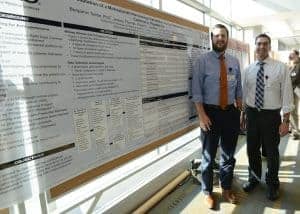LITTLE ROCK — The UAMS Translational Research Institute has received funding for a Clinical and Translational Science Award (CTSA) totaling $3,497,558 through Aug. 31, 2018.
The 11 months of funding comes from the National Center for Advancing Translational Sciences (NCATS) of the National Institutes of Health (NIH). It will enable UAMS to continue its mission of accelerating scientific discovery with innovative programs that help researchers translate their findings into new knowledge and treatments, said Translational Research Institute Director Laura James, M.D., UAMS associate vice chancellor for clinical and translational research.
“This is a significant federal research award for Arkansas,” James said. “We are very excited and proud to receive this award so that we can expand translational research at UAMS and improve the health of Arkansans through collaboration with our partner institutions – the Arkansas Children’s Research Institute and the Central Arkansas Veterans Healthcare System.”
The Translational Research Institute will apply for five years of CTSA funding in May 2018. If the May application is fully funded, the award would likely total more than $25 million. The first CTSA grant was awarded to UAMS in 2009.
Receipt of the $3.5 million award ensures that UAMS remains a member of the national CTSA consortium, made up of 62 academic research institutions across the country.
“In essence, the CTSA is the most important NIH grant an institution can receive,” said James, the award’s principal investigator. “Consortium members work very closely with each other to develop transferable solutions that address many of today’s greatest human health challenges.”
As a CTSA-funded site, UAMS directly helps researchers overcome long-standing obstacles to their work and provides patients tremendous opportunities to participate in cutting-edge clinical trials, in which they receive new medications and/or benefit from new treatments that are not available commercially. In addition, UAMS will continue to harness extremely large data sets, in concert with other institutions, to develop state-of-the-art solutions to health challenges. For example, these types of studies allow UAMS to use available data to understand if one treatment is better than another treatment for complex health care problems, such as mental illness, diabetes and other diseases that are common in Arkansas.
“The UAMS Translational Research Institute has been a significant contributor to the CTSA consortium in helping it meet its goals,” said Lawrence Cornett, Ph.D., UAMS vice chancellor for research. “This award ensures that UAMS clinical and translational investigators have ready access to diverse resources and approaches that the Translational Research Institute provides. Moreover, our researchers will benefit from resources available at over 60 other institutions within the consortium.”
In the last three years, the Translational Research Institute has launched or improved several research resources that are now being used by the UAMS research community:
- ARresearch.org, a volunteer research participant registry and website, was established in collaboration with lay members of the community so that researchers have access to a pool of over 3,600 individuals who have indicated an interest in hearing more about research volunteer opportunities.
- Arkansas Clinical Data Repository, a research data warehouse with de-identified patient data that researchers can use to understand patterns in data that will provide a framework to guide future studies testing new research treatments or approaches.
- UAMS Profiles, an online researcher-to-researcher networking/collaboration tool, which gives researchers a user-friendly way to locate potential research partners locally and nationally.
- TRI Portal, a cost-saving electronic request system for researchers, which allows the researcher to select from a menu of over 30 unique services and receive customized help with a research-related task in an efficient manner.
The Translational Research Institute partners with the UAMS Fay W. Boozman College of Public Health to provide a robust community engagement program to increase public involvement and participation in research at UAMS. Representative components of the program include:
- TRI’s Community Advisory Board, a diverse board whose members represent multiple grassroots segments of the state’s population. The board provides critical viewpoints, including their cultural and logistical perspectives that researchers need to make their studies operational.
- TRI’s Community Scientist Academy, which teaches the public how research is conducted and provides readiness training so that community members can serve as consultants to researchers and help plan the design and tools used in the research.
Additional components of the new CTSA award include funds to start a new informatics research consultation service, a new research subject recruitment program, and statistical services to ensure studies are properly designed to answer research questions. Other new programs that will be provided by the grant are dissemination services, so that the findings of research studies are communicated to numerous audiences, including research participants, the local community, other researchers, treating physicians and national audiences.
“The new grant allows us to get services to researchers, but more importantly, it allows UAMS, and our research partners, to tackle the health challenges we face here in Arkansas,” James said. “Our mission goes beyond research and really helps us as an academic community take better care of patients. The secondary effects of this grant will have a very important impact on Arkansas that includes benefits to our local workforce, economy and productivity as Arkansans.”
The NCATS/NIH award is under Award Number U54TR001629.
UAMS is the state’s only health sciences university, with colleges of Medicine, Nursing, Pharmacy, Health Professions and Public Health; a graduate school; hospital; northwest Arkansas regional campus; statewide network of regional centers; and seven institutes: the Winthrop P. Rockefeller Cancer Institute, Jackson T. Stephens Spine & Neurosciences Institute, Myeloma Institute, Harvey & Bernice Jones Eye Institute, Psychiatric Research Institute, Donald W. Reynolds Institute on Aging and Translational Research Institute. It is the only adult Level 1 trauma center in the state. UAMS has 2,834 students, 822 medical residents and six dental residents. It is the state’s largest public employer with more than 10,000 employees, including 1,200 physicians who provide care to patients at UAMS, its regional campuses throughout the state, Arkansas Children’s Hospital, the VA Medical Center and Baptist Health. Visit www.uams.edu or www.uamshealth.com. Find us on Facebook, Twitter, YouTube or Instagram.
UAMS is the state’s only comprehensive academic health center, with colleges of Medicine, Nursing, Pharmacy, Health Professions and Public Health; a graduate school; a hospital; a northwest Arkansas regional campus; a statewide network of regional centers; and seven institutes: the Winthrop P. Rockefeller Cancer Institute, the Jackson T. Stephens Spine & Neurosciences Institute, the Myeloma Institute, the Harvey & Bernice Jones Eye Institute, the Psychiatric Research Institute, the Donald W. Reynolds Institute on Aging and the Translational Research Institute. It is the only adult Level 1 trauma center in the state. UAMS has 3,021 students, 789 medical residents and two dental residents. It is the state’s largest public employer with more than 10,000 employees, including about 1,000 physicians and other professionals who provide care to patients at UAMS, Arkansas Children’s Hospital, the VA Medical Center and UAMS regional centers throughout the state. Visit www.uams.edu or www.uamshealth.com. Find us on Facebook, Twitter, YouTube or Instagram.
###















